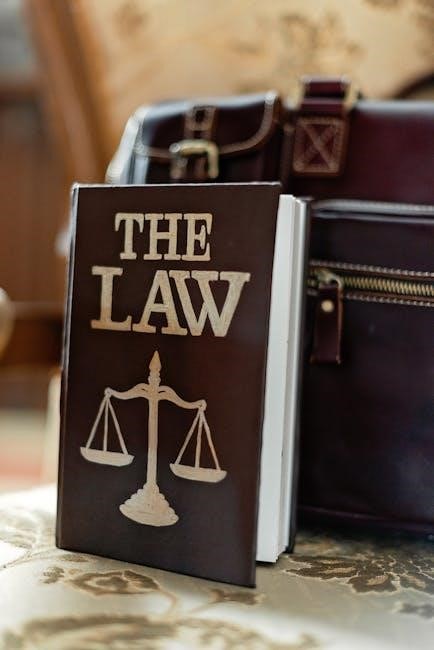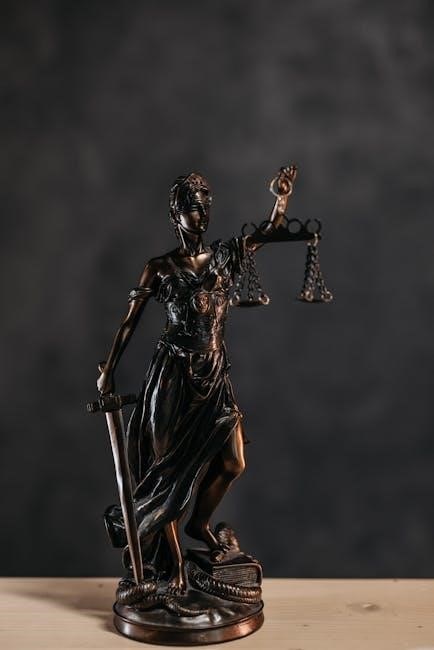John Rawls’ A Theory of Justice (1971) revolutionized political philosophy by introducing the concept of justice as fairness, emphasizing equality and liberty in societal structures.
Overview of the Revised Edition of “A Theory of Justice”
The revised edition of John Rawls’ A Theory of Justice incorporates significant revisions, reflecting critiques and Rawls’ evolving thoughts on justice as fairness. First published in 1971, the book was updated to address contemporary issues and refine its central doctrines. The revised version maintains the core principles while expanding on concepts like the original position and the two principles of justice.
Rawls’ revisions emphasize the importance of justice in societal structures, focusing on equal basic liberties and equitable opportunities. The book also explores the relationship between individual and society, addressing themes such as duty, ends, and the basic structure of society. This edition remains a foundational text in political philosophy, offering a detailed analysis of distributive justice and its relevance to modern challenges.
The Central Idea of Justice as Fairness
At the heart of Rawls’ theory lies the concept of justice as fairness, which posits that justice should be determined by principles agreed upon by rational individuals in an original position. This hypothetical scenario imagines individuals behind a veil of ignorance, unaware of their personal characteristics, social status, or position in society. This ensures that the principles chosen are fair and unbiased, prioritizing the well-being of the least advantaged.
Rawls argues that justice as fairness reconciles liberty and equality by ensuring equal basic rights and opportunities, while allowing social and economic inequalities only if they benefit the most disadvantaged. This framework provides a moral foundation for evaluating societal structures and promoting distributive justice, making it a cornerstone of modern political philosophy.
The Core Principles of Rawls’ Theory

Rawls’ theory centers on two primary principles: equal basic liberties and the difference principle, ensuring fairness and equality while allowing inequalities that benefit all society members.
The Two Principles of Justice
Rawls’ two principles of justice form the cornerstone of his theory. The first principle guarantees equal basic liberties, such as freedom of speech and religion, ensuring all individuals can pursue their life plans. The second principle, known as the difference principle, permits social and economic inequalities only if they benefit the least advantaged members of society. Together, these principles aim to create a just and fair society by balancing individual rights with the collective good.
The Original Position and Its Significance
The original position is a hypothetical scenario central to Rawls’ theory, where individuals come together to agree on principles of justice. Behind a “veil of ignorance,” they are unaware of their personal characteristics, social status, or position in society. This ensures that the principles chosen are fair and unbiased. The original position serves as a thought experiment to determine what a just society would look like, emphasizing fairness and equality. It is a crucial tool for evaluating and justifying moral and political principles, ensuring that justice is prioritized over personal gain.

The Role of Institutions in Rawls’ Framework
Rawls’ framework emphasizes that institutions must operate under principles ensuring equal basic liberties and equitable opportunities, structuring society to distribute benefits and burdens fairly.
Duty, Ends, and the Basic Structure of Society
Rawls’ theory underscores the importance of the basic structure of society as the primary subject of justice, focusing on how institutions distribute benefits and burdens. He argues that duty and ends are central to understanding moral obligations within this framework. The basic structure, encompassing economic, legal, and political systems, must align with principles of justice to ensure fairness. Rawls emphasizes that individuals’ duties arise from their roles within these structures, while their ends, or goals, should be pursued without compromising just institutions. This approach prioritizes the fairness of the system over individual utility, ensuring that societal arrangements promote equality and liberty for all. By focusing on the basic structure, Rawls provides a comprehensive framework for evaluating justice in society, addressing both distributive justice and the moral responsibilities of individuals within it.
The Relationship Between Individual and Society

Rawls’ theory explores the dynamic relationship between the individual and society, emphasizing that societal institutions must prioritize justice to ensure individual rights and freedoms. He argues that individuals are both moral beings and rational actors, capable of forming and revising their own conceptions of the good life. Society’s role is to provide a framework that allows individuals to pursue their ends while respecting the principles of justice. Rawls’ framework ensures that individual liberties are protected and that social cooperation is fair and equitable. This balance between individual autonomy and societal needs is central to his vision of a just society, where the collective good is achieved without compromising individual dignity or potential.

Critiques and Contemporary Relevance
Rawls’ theory faces critiques from libertarians and communitarians, yet remains influential in addressing contemporary issues like race, health, and global inequality, shaping political philosophy and ethics.

Limitations of Rawls’ Theory in Light of Modern Issues
Rawls’ theory has faced criticism for its limitations in addressing modern challenges such as race, colonialism, health, migration, and environmental issues. Critics argue that the theory’s focus on the basic structure of society overlooks the complexities of global inequality and multiculturalism. Additionally, Rawls’ reliance on the original position as a thought experiment has been questioned for its inability to account for the diverse perspectives of individuals in real-world scenarios. While the theory emphasizes fairness and equality, its application to contemporary global challenges remains problematic. Scholars have highlighted the need for revisions to accommodate the nuances of modern society, ensuring that justice is not only theoretical but also practically achievable in a rapidly changing world.
Applications of the Theory in Addressing Global Challenges

Rawls’ theory of justice, particularly his principles of fairness and equality, offers valuable insights for addressing global challenges. His concept of the original position encourages decision-making that prioritizes the well-being of the least advantaged, applicable to issues like global poverty and climate change. The theory’s emphasis on basic liberties and equal opportunities can guide international policies on migration, health equity, and human rights. Additionally, Rawls’ framework supports the idea of a global basic structure, advocating for fair international institutions and resource distribution. While critics argue for further refinements, the theory remains a foundational tool for promoting justice in global contexts, inspiring solutions that balance individual freedoms with collective responsibilities on a worldwide scale.
John Rawls’ Theory of Justice remains a cornerstone of political philosophy, emphasizing justice as fairness, the original position, and the two principles, ensuring its enduring relevance in ethical discourse.
The Influence of Rawls’ Theory on Political Philosophy
John Rawls’ A Theory of Justice significantly shaped modern political philosophy by reintroducing the concept of justice as fairness, offering a moral framework that prioritizes equality and basic liberties. His ideas challenged utilitarianism and revitalized the social contract tradition, influencing scholars like Amartya Sen and Martha Nussbaum. Rawls’ emphasis on the original position and the two principles of justice provided a structured approach to addressing distributive justice, inspiring debates on global inequality and institutional design. His work remains foundational in ethics, human rights, and political theory, guiding discussions on fairness in diverse contexts, from healthcare to global governance.
